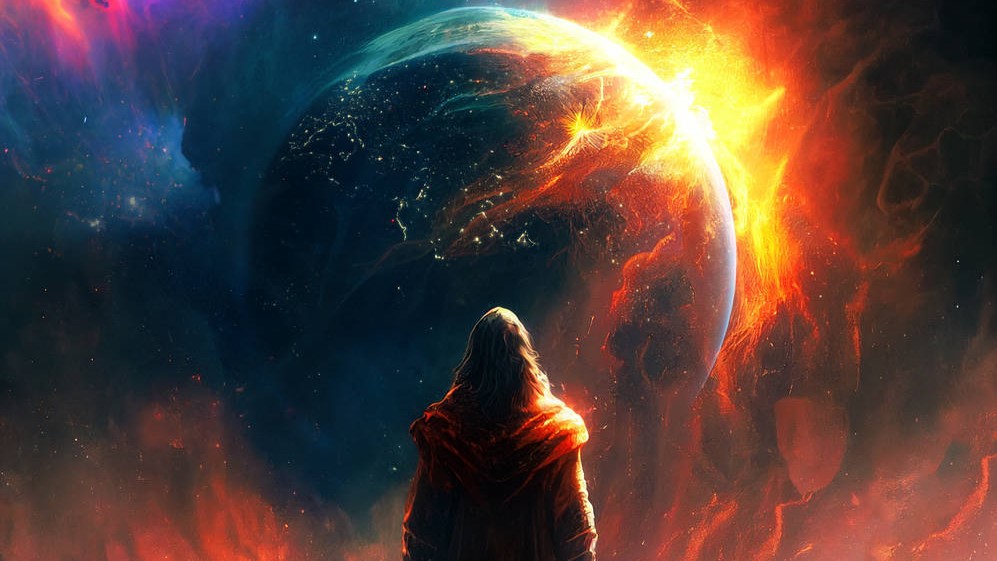Revelation 15:1, 16:1: “Then I saw another sign in heaven, great and amazing, seven angels with seven plagues, which are the last, for with them the wrath of God is finished … 16:1Then I heard a loud voice from the temple telling the seven angels, “Go and pour out on the earth the seven bowls of the wrath of God.”
- Revelation 16 is one of the most stunning portions of the Bible. Here, God is about to conclude His judgement upon a world that has rejected His Son. In the seven judgements which follow, “the wrath of God is finished” (15:1). Have someone read through this chapter slowly for your group. Receive the words with wonder and awe, even as John experienced them. Go around the room: what are your first impressions? See Psalm 2:12.
- In 16:2 we find the first ‘bowl’ judgment: painful sores. Read Exodus 9:8-10. While it’s not directly stated, there is no indication that these boils broke out on the Israelites, but only on the Egyptians. (That distinction is clearly made in Exodus 8:22 and 9:4, and is implied in 9:11.) We find this same distinction in Rev. 16:2. Talk about this. Though believers in the Tribulation will certainly suffer, it will be different for them in some ways. While believers today live “in” this sinful world, how do we suffer differently than unbelievers, even when enduring the same trials (1 Thess. 4:13)? Consider: 2 Peter 2:7–8. How did Lot suffer? How was he affected by the wickedness of his city? How are you affected by yours? How is he called “righteous” in spite of it? How are you? Look at Luke 17:28-30. What is Jesus saying here? Discuss Psalm 34:19. How is this verse still true when we encounter severe trials? See also Psalm 71:20-21.
- Revelation 16 is, as one man put it, “very dark and very sad.” Why do you think God chose to record such things? What does He want us to take away from reading them? How does He expect us to respond?
- Certainly, in the earth’s final judgements, the idea that ‘sin has no consequences’ is shown to be a lie. How do we see this lie (which has been around since the Garden) lived out in society today? What should our response be? Why is the 5th ‘bowl’ (16:10-11) so appropriate? How is ‘darkness’ a judgement?
- Some of the ‘bowl’ judgements target the ecology: the 2nd ‘bowl’ targets the sea; the 3rd, rivers and springs; the 4th involves the sun; the fifth, the light; and the 6th, the Euphrates River. In this age of ‘climate craziness,’ what do these verses tell us about whose really in control? Consider and discuss: Matthew 5:45b, 8:24-27, 14:25, 17:27; Job 37:5-6. One thing’s for sure: during the Tribulation, the earth will experience some climate change! Not man-made, but God-made!
- How do the unbelievers respond to the judgments in the Book of Revelation? Read 9:20-21, 16:9, 16:10b-11, 16:21. What does this tell us about the depth of sin and the blindness of being lost? What does it tell us about us? Consider: 1 Peter 2:9; Ephesians 1:3-6, 11; 2 Thess. 2:13. How do these verses make you feel?
- God is a God of mercy and love – He clearly demonstrated this by sending Jesus into the world to die for wicked sinners. However, God is also a God of perfect justice. How did the cross demonstrate the love, the mercy, AND the justice of God?
- Jason Dexter offers an interesting insight:
“After World War II, Nazi war criminals were tried for their crimes in the Nuremberg trials. But before their sentences, the allies sent chaplains to share the gospel with the Nazi leaders, some of whom actually repented. The Nazis who genuinely repented will be forgiven by God and can enter heaven. Still, all of those found guilty were sentenced to execution. How would you feel watching those trials if you were a family member of a Jewish victim of the holocaust? Would you want the Nazis set free or would you want justice served? Most would want justice. And justice demands a penalty. If a judge set them free, surely many would rise up in anger and say that the judge was corrupt or unfair. When the judge did his job and gave them a righteous sentence, no one will blame the judge. The Nazis got what they deserved. As sad as it is, it is also right … Some cast stones at God and claim that He is too harsh of a judge. God is perfectly just and holy. We should praise Him for His righteous judgments, even when those judgments are very serious and sad to behold. Do not judge God. God is the judge, not you. Behold Him for who He is.”1
Your thoughts?
1 Dexter, Jason, Study Revelation: 36 Practical Lessons on Apocalyptic Events (2022) on Revelation 16.

